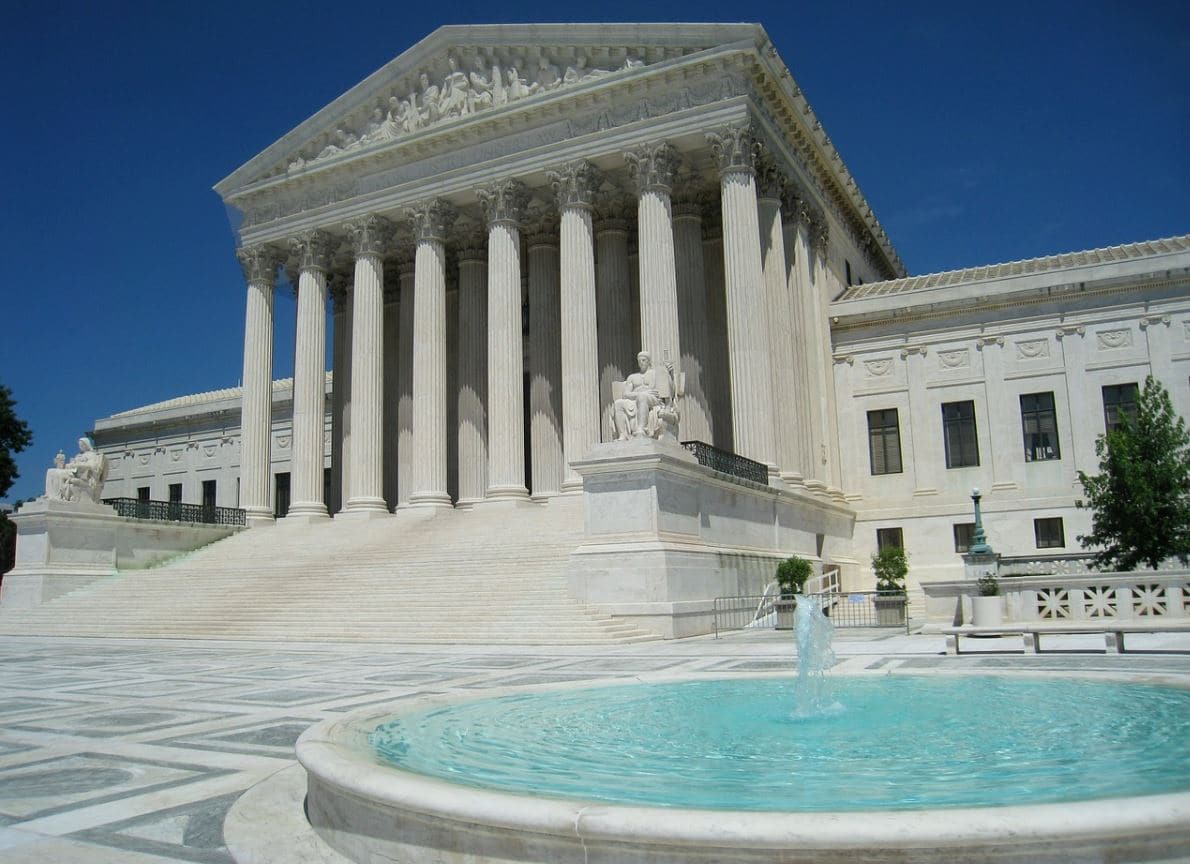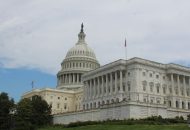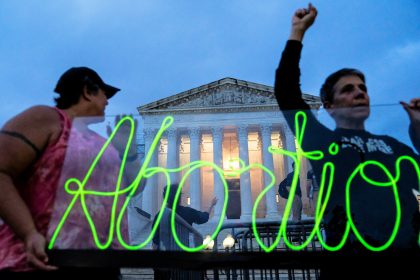What’s Next for the Supreme Court? Affirmative Action, 1st Amendment Rights, Wetlands Protection

WASHINGTON — With its ruling on Biden v. Texas, a case in which it allowed the Biden administration to terminate the controversial Trump-era asylum policy known as “remain in Mexico,” the Supreme Court on Thursday concluded what was undoubtedly one of its most momentous terms in recent memory.
After a deliberate lull immediately before and after the 2020 election, the court’s new conservative super majority charged headlong into some of the most contentious debates of the past several decades, overturning Roe v. Wade and other landmark cases, and often stunning long-time court watchers.
In a matter of days, the conservative justices on the court recognized a constitutional right to carry firearms outside the home and dramatically weakened the Environmental Protection Agency’s ability to regulate the greenhouse gas emissions from coal-fired power plants.
But it was its ruling in Dobbs v. Jackson Women’s Health Organization, the case that overturned Roe and with it, the federal protection of a right to an abortion, that appears to have sealed the current court’s reputation as no less a political body than the United States Congress.
A two-day public opinion poll conducted by Reuters/Ipsos immediately after the ruling in Dobbs was handed down found 57% of Americans now have an unfavorable view of the court, while 43% viewed it favorably.
The results of the survey marked a significant shift from a June 6-7 Reuters/Ipsos poll that showed 48% had an unfavorable view and 52% a favorable view.
In addition 27% of respondents had a very unfavorable view of the court, up from 14% who held that view earlier in the month.
The reversal was almost entirely because of mounting displeasure with the court among Democrats, who are typically more supportive of abortion rights than Republicans are.
Even more compelling is the latest “Stat Pack” published by SCOTUSblog, which shows how divided the justices themselves have become.
SCOTUSblog publishes a statistical analysis at the end of every Supreme Court term to provide data-driven analysis of the Supreme Court’s term and identify trends over time.
An archive of every Stat Pack dating back to the October Term 1995 is available here.
This term, which began in October 2021, marked a historic decline in unanimous outcomes and a surge of 6-3 decisions along ideological lines, SCOTUSblog’s researchers found.
Only 29% of cases were decided unanimously, the lowest rate of unanimity in the two decades that the researchers have been tracking the statistic, and 19 decisions, or about 30% of the court’s rulings on the merits, were decided in a 6-3 vote.
Of those 19 decisions, 14 were polarized decisions in which all six Republican-appointed justices were in the majority and all three Democratic-appointed justices were in dissent.
It’s also interesting to note that according to the latest Stat Pack, Chief Justice John Roberts and Justice Brett Kavanaugh were in the majority in 95% of the court’s decisions (and 93% of non-unanimous decisions).
Roberts and Kavanaugh were each in dissent in only three cases this term.
Also noteworthy is the fact Justice Sonia Sotomayor was the court’s foremost dissenter this term, being in the majority in only 58% of the court’s decisions (and 41% of its non-unanimous decisions), the lowest of any justice.
By the time the term ended on Thursday, she had dissented in 27 cases.
So what’s next for the court? While it’s only July 4th weekend, a number of divisive issues are already on the court’s docket for the next term.
Come the first Monday of October, the justices are slated to hear cases that will determine to what extent affirmative action can be used to guide college admissions, whether a website designer had a constitutional right to refuse to create a website for same-sex weddings, and to what extent the Environmental Protection Agency can protect sensitive wetlands from developments.
If that’s not enough controversy for one term, the justices have also agreed to review the “independent state legislature” theory next term. Under that theory, state legislatures have broad power to set rules for federal elections, even if state courts say those rules are unconstitutional.
Below is a roundup of some of the cases expected to make headlines next year.
Moore v. Harper
This is the North Carolina elections case. The justices are being asked to decide whether a state’s judicial branch may nullify the regulations governing the “Manner of holding Elections for senators and representatives … prescribed … by the Legislature” and replace them with regulations of the state courts’ own devising. Read more.
Sackett v. Environmental Protection Agency
Petitioners Michael and Chantell Sackett own a vacant lot in a mostly built-out residential subdivision near Priest Lake, Idaho. According to their petition to the high court, the lot has no surface water connection to any body of water. In April 2007, with local permits in hand, the Sacketts began building a family home. Later that year, however, the Environmental Protection Agency shut down construction on the site saying it violated the Clean Water Act because their lot contains wetlands that qualify as regulated “navigable waters.” The case is on appeal from the 9th circuit. The case asked whether the court of appeals applied the proper test for determining whether wetlands are “waters of the United States” under the act.
Students for Fair Admissions Inc. v. President & Fellows of Harvard College
One of two cases before the court, the other being Students for Fair Admissions v. University of North Carolina, asking whether the justices should overrule Grutter v. Bollinger and hold that institutions of higher education cannot use race as a factor in admissions. Both cases also ask the court to determine if the universities violated the Civil Rights Act by rejecting “workable race-neutral alternatives.” Read more.
Merrill v. Milligan
The state of Alabama stands accused of failing to use data in the 2020 Census to create an additional “minority-majority” district in its new congressional district map. The court is being asked to determine whether the state’s Redistricting plan for its seven seats in the United States House of Representatives violated Section 2 of the Voting Rights Act. Read more.
National Pork Producers Council v. Ross
California’s Proposition 12 bans the sale of pork in the state unless the sow from which it derived was housed with space allowances that the council claims almost no farms satisfy. The petitioners say the “massive” costs of complying with Proposition 12 fall almost exclusively on out-of-state farmers. And because a single pig is processed into cuts that are sold nationwide in response to demand, those costs will be passed on to consumers everywhere, in countless transactions having nothing to do with California.
The main question in the case is whether allegations that a state law has dramatic economic effects largely outside of the state and requires pervasive changes to an integrated nationwide industry violates the dormant Commerce Clause.
Andy Warhol Foundation for the Visual Arts v. Goldsmith
The petitioners are asking the court to settle a conflict among several circuit courts by affirming its position that a work of art is “transformative” for purposes of fair use under the Copyright Act if it conveys a different “meaning or message” from its source material.
The case comes from the 2nd Circuit, which held that courts are forbidden from trying to “ascertain the intent behind or meaning of the works at issue.” Instead, the court concluded that even where a new work indisputably conveys a distinct meaning or message, the work is not transformative if it “recognizably deriv[es] from, and retain[s] the essential elements of, its source material.” Read more.
Axon Enterprise v. Federal Trade Commission
At issue in this case is whether Congress “impliedly” stripped federal district courts of jurisdiction over constitutional challenges to the Federal Trade Commission’s structure, procedures, and existence by granting the courts of appeals jurisdiction to “affirm, enforce, modify, or set aside” the commission’s cease-and-desist orders.
Percoco v. U.S.
This case asks, does a private citizen who holds no elected office or government employment, but has informal political or other influence over governmental decision making, owe a fiduciary duty to the general public such that he can be convicted of honest-services fraud?
The petition was filed by Joseph Percoco — former campaign manager for then-Gov. Andrew Cuomo’s reelection — who was arrested for allegedly accepting $35,000 to help a developer navigate the state bureaucracy.
According to the 2nd Circuit, Percoco owed a duty of honest services to the public because, as a former high-ranking staffer and longtime friend of the governor, he continued to command “clout” with state agencies and officials.
Dan can be reached at [email protected] and at https://twitter.com/DanMcCue
























